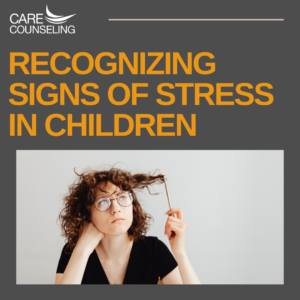Identifying Stress in Children
 Childhood is a time of exploration, growth, and learning, but it’s not without its share of stressors. As a parent, recognizing the signs of stress in your child and helping them develop effective stress management strategies is crucial for their well-being and emotional resilience.
Childhood is a time of exploration, growth, and learning, but it’s not without its share of stressors. As a parent, recognizing the signs of stress in your child and helping them develop effective stress management strategies is crucial for their well-being and emotional resilience.
Recognizing Signs of Stress
Stress in children can manifest in various ways, often with subtle cues that might be easy to miss. By staying attentive and observant, you can identify these signs and address them proactively.
- Physical Symptoms:
Look out for physical indicators such as headaches, stomachaches, changes in appetite, sleep disturbances, and fatigue. Frequent illnesses or complaints of feeling unwell might also be related to stress.
- Behavioral Changes:
Notice changes in behavior, such as withdrawal from social activities, increased irritability, mood swings, excessive clinginess, or even regressive behaviors like bedwetting.
- Academic Performance:
A sudden decline in academic performance, reluctance to go to school, or lack of interest in previously enjoyed activities could indicate heightened stress.
- Emotional Responses:
Pay attention to emotional responses like increased crying, expressions of fear or worry, frequent temper tantrums, or difficulty managing emotions.
- Sleep Disturbances:
Changes in sleep patterns, such as trouble falling asleep, frequent nightmares, or restless sleep, can signal underlying stress.
- Perfectionism:
While a desire to excel is positive, extreme perfectionism can lead to stress. Watch for signs of excessive self-criticism or frustration when things don’t go as planned.
Strategies for Stress Management
- Open Communication:
Foster an environment where your child feels comfortable discussing their feelings. Regularly check in with them about their day, any concerns they might have, and provide a listening ear.
- Encourage Expressive Activities:
Engage your child in creative outlets like drawing, writing, or even role-playing to help them express their emotions in a healthy and constructive manner.
- Practice Mindfulness:
Teach your child mindfulness techniques such as deep breathing, guided imagery, or simple meditation exercises. These techniques can help them stay grounded and manage stress in the moment.
- Physical Activity:
Engaging in regular physical activities, whether it’s playing a sport, dancing, or going for a walk, helps release built-up tension and promotes a sense of well-being.
- Establish Routines:
A consistent routine provides a sense of security and predictability, reducing uncertainty and stress. Help your child establish routines for school, homework, meals, and sleep.
- Limit Over-Scheduling:
While extracurricular activities are important, over-scheduling can lead to burnout. Ensure a balance between activities and downtime.
- Teach Problem-Solving:
Equip your child with problem-solving skills. Guide them in breaking down challenges into manageable steps, brainstorming solutions, and evaluating outcomes.
- Encourage Social Connections:
Positive relationships with peers, family, and friends offer a support system that helps children cope with stress. Encourage healthy social interactions.
- Healthy Lifestyle Choices:
Promote nutritious eating, regular exercise, and sufficient sleep as these contribute to overall well-being and help manage stress.
- Lead by Example:
Model healthy stress management behaviors. Your child learns from watching how you handle stress, so demonstrating effective coping strategies is invaluable.
- Offer Reassurance:
Remind your child that it’s okay to feel stressed sometimes and that you’re there to support them. Provide reassurance that challenges are opportunities for growth.
- Seek Professional Help:
If you notice persistent signs of stress that significantly impact your child’s well-being, consider seeking support from a pediatrician, counselor, or therapist.
Recognizing stress in children and equipping them with effective stress management strategies is an essential aspect of parenting. By staying attentive to physical, emotional, and behavioral cues, you can provide timely support. Open communication, mindfulness techniques, physical activity, and other strategies can help your child develop resilience and healthy ways to cope with stress. Remember that each child is unique, so tailor your approach to their personality and needs. By fostering these skills early on, you’re providing your child with valuable tools that will serve them throughout their lives.



























